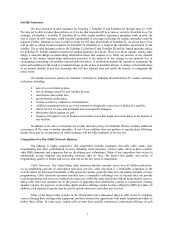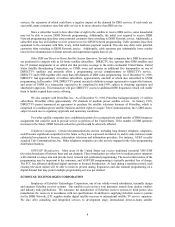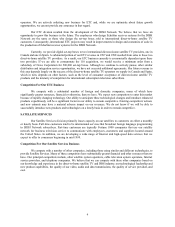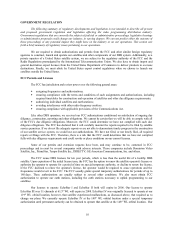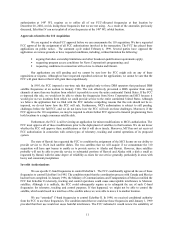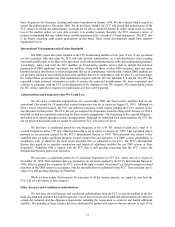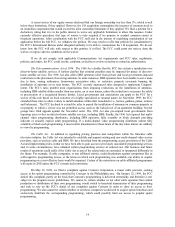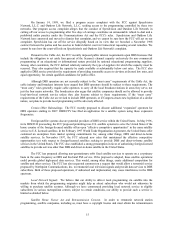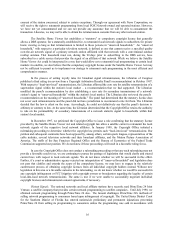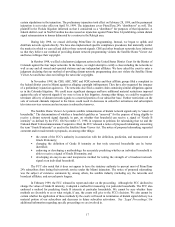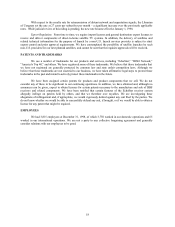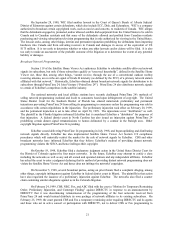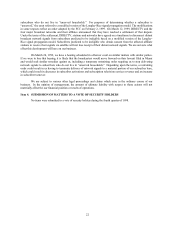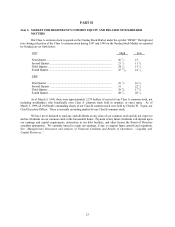Dish Network 1998 Annual Report Download - page 19
Download and view the complete annual report
Please find page 19 of the 1998 Dish Network annual report below. You can navigate through the pages in the report by either clicking on the pages listed below, or by using the keyword search tool below to find specific information within the annual report.17
certain stipulations in the injunction. The preliminary injunction took effect on February 28, 1999, and the permanent
injunction is set to take effect on April 30, 1999. The injunctions cover PrimeTime 24’s “distributors” as well. The
plaintiff in the Florida litigation informed us that it considered us a “distributor” for purposes of that injunction. A
federal district court in North Carolina has also issued an injunction against PrimeTime 24 prohibiting certain distant
signal retransmission to homes delineated by a contour in the Raleigh area.
During July 1998, we ceased delivering PrimeTime 24 programming. Instead, we began to uplink and
distribute network signals directly. We have also implemented specific compliance procedures that materially restrict
the market in which we can sell and deliver those network signals. CBS and other broadcast networks have informed
us that they believe our method of providing distant network programming violates the Satellite Home Viewer Act
and hence infringes their copyright.
In October 1998, we filed a declaratory judgment action in the United States District Court for the District of
Colorado against the four major networks. In the future, we might attempt to certify a class including the networks as
well as any and all owned and operated stations and any independent affiliates. We have asked the court to enter a
judgment declaring that our method of providing distant network programming does not violate the Satellite Home
Viewer Act and hence does not infringe the networks’ copyrights.
In November 1998, the CBS, ABC, NBC and FOX networks and their affiliate groups filed a complaint in
the federal district court in Miami against us alleging copyright infringement. They have also requested the issuance
of a preliminary injunction against us. The networks also filed a counter claim containing similar allegations against
us in the Colorado litigation. We could incur significant damages and have additional material restrictions imposed
against the sale of network signals if we were to lose in this litigation. Among other things, we could be required to
terminate delivery of distant network signals to a material portion of our subscriber base. Further restrictions on the
sale of network channels imposed in the future could result in decreases in subscriber activations and subscription
television services revenue and an increase in subscriber turnover.
The Satellite Home Viewer Act permits satellite retransmission of distant network signals only to “unserved
households.” The determination of whether a household qualifies as “unserved” for the purpose of being eligible to
receive a distant network signal depends, in part, on whether that household can receive a signal of “Grade B
intensity” as defined by the FCC. On November 17, 1998, in response to petitions for rulemaking that we and the
National Rural Telecommunications Cooperative filed, the FCC released a notice of proposed rulemaking concerning
the term “Grade B intensity” as used in the Satellite Home Viewer Act. The notice of proposed rulemaking requested
comment and/or made tentative proposals, on among other things:
• the extent of the FCC’s authority in connection with the definition, prediction, and measurement of
Grade B intensity;
• changing the definition of Grade B intensity so that truly unserved households can be better
identified;
• endorsing or developing a methodology for accurately predicting whether an individual household is
able to receive a signal of Grade B intensity; and
• developing an easy-to-use and inexpensive method for testing the strength of a broadcast network
signal at an individual household.
The FCC also noted that it does not appear to have the statutory authority to prevent most of PrimeTime
24’s subscribers from losing their network service under the Miami injunction. The notice of proposed rulemaking
was the subject of extensive comments by, among others, the satellite industry (including us), the networks and
broadcast affiliates, and several sports leagues.
In February 1999, the FCC released its report and order on the proceeding. Although the FCC declined to
change the values of Grade B intensity, it adopted a method for measuring it at particular households. The FCC also
endorsed a method for predicting Grade B intensity at particular households. We cannot be sure whether these
methods are favorable to us or what weight, if any, the courts will give to the FCC’s decision. We also cannot be
certain whether the application of these methods by the courts will result in termination of distant signal delivery to a
material portion of our subscribers and decreases in future subscriber activations. See “Legal Proceedings” for
additional information regarding specific proceedings we are involved in.


